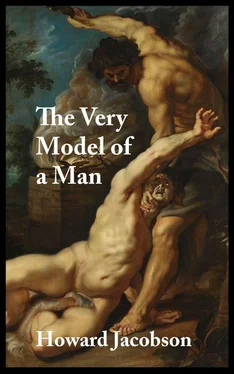‘We enjoy a degree of latitude,’ Semyaza told her, opening and closing his wings and fluttering in his own draught, ‘as to how we interpret His will. Else we would be slaves, not angels. But now, I think, is as propitious an hour as any to the application of camomile and talcum.’ He lowered his head, like an itching macaw. ‘Remember — I feel no pain.’
When he next essayed the strength of his grip and will-power it was on her in person. A cooler day, no perturbations of the heavens, his descent all unannounced, not a rip or ruffle of a single feather to tell her he had landed. He was behind her before she could let out a cry, a hand on each breast, tightening.
This time I did come down from the tree.
Does it surprise you that I could feel concern for my brother’s safety, when it was I who at the very hour of his birth had passed a death sentence on him?
It shouldn’t.
Who can you possibly care more for than a person whose continuing existence depends largely on yourself?
I loved Abel. Considering how little contact I had with him as a baby, how infrequently we played together, how few were the occasions when his rubbery belly was given me to blow on or paddle in, I loved him to excess. Let him not die, I prayed, lying sleepless under the too-bright stars. I will not allow him to die, I promised. I will not allow a hair of his head to be harmed. If he dies before me I shall not be able to support my grief.
Does this mean that I had lifted his death-sentence? Far from it. I simply took upon myself his protection because I knew better than anybody the extent of the danger he had to be protected from.
I see incipient amusement watering the corners of an eye or two among you. Our old difficulty. Or rather, your old difficulty. Babel-levity. Shinarite-scepticism. Evidently you are uncomfortable with the robustness of my definitions of devotion. This is a pity. A man who has slain his brother has the right to feel he should be listened to on the subject of love. Especially in this city where, if you will forgive me, you hold to the sentimental, parochial view that the affections are not to be confused with the disaffections — at least in discourse. Which is tantamount to taking a vow of silence on the matter, and a consequence, as you don’t need me to point out, of every deity having fled the glaring sunlight of your streets.
I put it to you anyway, whether or not your smiles go off like crackers on your faces, that we never have more to fear than when we are loved extravagantly. Not because extravagant love turns to extravagant hate, but because extravagant love already is extravagant hate. Only the impulse to murderousness, known here — no, here! here! — in every heart, can explain the irrationality of the thing we call adoration. Only murderousness would ever look to hide in such a place. It is common for lovers to set out on their acquaintance as enemies. It is regarded as quaint, touching even, that they should have misread each other quite so badly in the beginning. They did not. They fell in love — yes, even under the shadows of your immaculate rational ziggurats they fell in love — precisely so as not to fall, each to each, in bloody combat. What we call infatuation is nothing other than being mesmerised by the realisation that we can juggle violence.
And I did infatuate myself with Abel. With the idea of his well-being. With the very principle of his life. I mean, quite unfancifully, that I assumed responsibility for the beating of his heart. I listened out for it. I watched over it. I monitored its regularity. In the dead of night, once I could be sure that my mother was asleep, and my father — at that distance stipulated by the laws of pollution, from where he could not inadvertently roll over and uncover the fountain of my mother’s blood — was on his back and whimpering in his dreams, I crept along the ground like the unmentionable serpent, silently, invisibly, my trunk slithering in sand or sucked downwards in the mud, until I reached the hollowed bark, the hallowed boat beached in a desert oasis, where Abel lay unconscious alike of enemy or protector. Sometimes I would be content to sit with my back against his crib, looking up into the stars and listening for his breathing. I did not especially want to see him. Or touch him. Mine was not a love of that kind. It was sufficient to know he was alive. If the smell of new-grown hair and new-formed bone blew from his skull into my nostrils, well and good. But I did not need to grasp him through my senses: the idea I had of him did not want for vividness, and besides, the odour of new creation was of all odours the one I would most happily have gone without.
There were nights, though, when his breathing was so quiet that I could not be certain it was there at all. And it was on these nights that love became indistinguishable from panic — an obstruction the size of a mountain blocking up my breathing — and I would crouch over him, a black shadow obliterating the moon, and lay my ear to his silent heart. Hours on end I would stay like that, not daring to withdraw for fear that I might choose the very moment to leave that his heart chose to stop.
It is a fearful burden, to be one’s brother’s keeper. The vigil breeds its own impositions; the precautions turn on themselves and become hazards.
What if my listening was itself a pressure on his chest?
What if the weight of my head was the very thing that would make his heart give up?
What if he should sense my alarm through his sleep and die of my dread that he would die?
Or suppose he should suddenly wake and find me looming above his cot, a beast preparing to devour him with its ear — what then? Would that not have been enough to stop a heart twice the size of his?
The darkness gave me no respite. Once I had staked my peace on his pulse I could not leave until the first sickly glimmerings of dawn. Make no mistake: I knew that that too was arbitrary. That Abel might just as soon pick that minute to spite me with his extinction, might just as plausibly stop living in the light as in the dark. But all obsessional behaviour this side of madness must make a concession to normality somewhere, and light was the determining factor in where I made mine.
I had to avoid being caught hanging over him. I did not want it to be known how immoderately I feared for his life. I shrank from being exposed for what I was — a brother lover.
Is that not normalcy? A resistance to the whole world’s knowing that I doted on my sibling? Even if the whole world only did comprise the four of us. Two plus me plus him. Her minus me plus them squared.
Roughly coincident with my immoderately loved brother’s first birthday (I kept a tally of the days of my desolation, just as my father did his), two events occurred, independent of each other but combining to produce a result the majority of us (Abel not counting) thought desirable: the resumption of family relations and the phased withdrawal of the supranatural to Its proper sphere.
The first of these events, to which I have already alluded briefly, was Semyaza’s abrupt avolation — call it decampment, or desertion, or simply resignation — from the ranks of the heavenly choir, where I suppose him to have grown weary singing the praises of Somebody Else, and his unheralded appearance on earth, sans Azael, sans ceremony, his feathers scorched from the velocity of his descent, hell-bent on rape…
But I cannot be convinced you have earned the right to hear of that tonight. A man does not speak to strangers of a rape upon his mother by an archangel unless he can be certain of their seriousness…
‘There was a destitute widow,’ Korah began, ‘a pauper’s relict, mother of two starving daughters, orphans…’
Читать дальше











